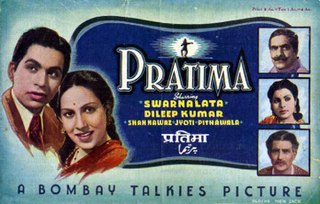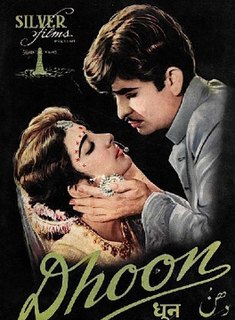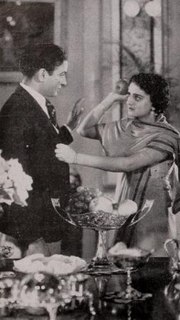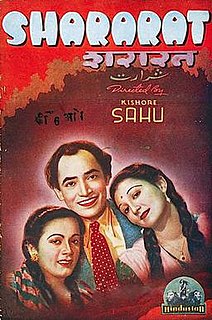Related Research Articles

Pyar Kiye Jaa is a 1966 Indian Hindi-language romantic comedy film directed by C. V. Sridhar starring Kishore Kumar, Shashi Kapoor, Mehmood, Om Prakash, Mumtaz, Kalpana and Rajasree. It was a "semi-hit" at the box office. The film is a remake of the Tamil comedy Kadhalikka Neramillai (1964), which was remade into Telugu as Preminchi Choodu in 1965. Actress Rajasree starred in all three versions of the film. Kadhalikka Neramillai was also later remade in Kannada as Preethi Madu Thamashe Nodu and in Marathi as Dhoom Dhadaka. The role played by Nagesh in the Tamil version was reprised by Mehmood in the Hindi version and by Dwarakish in the Kannada version.

Pratima is a 1945 Indian Hindustani-language movie directed by Paidi Jairaj. The film was produced by Bombay Talkies and was the directorial debut of P. Jairaj. The film stars Dilip Kumar, Swaran Lata, Mumtaz Ali, Shah Nawaz and Mukri. Swarn Lata was cast following her big success the preceding year, Rattan (1944). Mukri was cast in his debut role by Devika Rani, who is stated to have "liked his smile and off-screen enthusiasm". The music direction was by Arun Kumar Mukherjee and the lyricist was Narendra Sharma.
Musafir is a 1940 social Hindi language film directed by Chaturbhuj Doshi. Produced by Ranjit Studios, the music was by Gyan Dutt and it starred Noor Mohammed Charlie, Khursheed, Ishwarlal and Yakub.

Dhoon is a 1953 Bollywood film directed by M. Kumar. The film was produced by Silver Kings, a production company formed by Kumar and his then wife, actress Pramila. The film stars Raj Kapoor, Nargis, Motilal, Kumar, Pramila, E. Bilmoria, Leela Mishra and Kamal Mehra. Mehra was a lesser known comedian who started his career in 1951 with Naujawan. He went on to act in several films before starting his own production company Pride Of India under which he made films like Kismat (1968), Mahal (1969) and Naami Chor (1977). The music was by Madan Mohan.

Bansari is a Bollywood social film. It was released in 1943. Music composition was by Gyan Dutt with lyrics written by D. N. Madhok. The film was produced by Chandulal Shah for Ranjit Studios. Directed by Jayant Desai, it starred Ishwarlal, Noor Mohammed Charlie, Dixit, Shamim Akhtar, Kesari and Urmila.

Yakub Mehboob Khan, known as Yakub, was an Indian actor born into a Pathan family in 1904, in Jabalpur, Madhya Pradesh, India. He died in 1958 after a career spanning thirty years in the film industry. He is best known for his comedic, villainous roles. He began his career with roles as an extra, but eventually was cast in more important roles, frequently playing the parts of heroes and villains. He became one of the most renowned screen villains, while achieving equal success in comedy and character roles. Yakub appeared in over 100 films.
Ghory and Dixit were a comedy duo comprising Nazir Ahmed Ghory and Manohar Janardhan Dixit. They were active in Indian cinema during the 1930s and 1940s. They were called the Indian Laurel and Hardy. The duo had starred in several films including Do Badmaash, Sitamgarh, Toofani Toli and Bhola Raja. Most of their films were produced by Ranjit Studios. Unlike Laurel and Hardy they played only supporting roles in their films.

Noor Mohammed Charlie (1911–1983), popularly known as Charlie, was a Pakistani actor born on 1 July 1911 in Ranavav village, Porbandar, Saurashtra, British India. Best known for his comedy roles, he was the first 'star' comedian and has been referred to as India's first comedy king. He acted with several top actresses of those days as a comic hero. Being a great fan of Charlie Chaplin, he took the name "Charlie" as his screen name following the release of his popular film The Indian Charlie (1933). He had a successful career in pre-partition India from 1925–1946. His shift to Pakistan following partition saw his career going down with less than 12 films. He shifted to the US to live with his son and returned later to Pakistan where he died in 1983.
Chandrahasa is a 1933 Hindi mythological costume drama film directed by Sarvottam Badami. It was the first Hindi film directed by Badami bringing him into prominence, even though he did not know Hindi. It was also one of the first Talkie versions of the film which was remade several times. Produced by Sagar Movietone, it had music composed by S. P. Rane. The film starred Noor Mohammed Charlie, Gulzar, Kamala, Master Bachchu, Dinkar, Mehboob Khan and Baburao Sansare.

Teen Sau Din Ke Baad is a 1938 Hindi social comedy film directed by Sarvottam Badami. This was Badami's first comedy film and it was a success at the box-office; he went on to direct two more comedies after this, Aap Ki Marzi (1939) and Ladies Only (1939), also successes. The film was produced by Sagar Movietone, with story written by Babubhai A. Mehta and dialogue by Wajahat Mirza and Waqif. The music was composed by Anil Biswas with lyrics by Zia Sarhadi. The director of photography was Faredoon Irani and the film starred Bibbo, Motilal, Sabita Devi, Yakub, Pesi Patel and Gulzar.
Ladies Only is a 1939 Indian Hindi-language social comedy film directed by Sarvottam Badami. Produced by Sagar Movietone, it had music by Anupam Ghatak and starred Surendranath, Sabita Devi, Bibbo and Prabha. This was the last comedy film made by Sarvottam Badami before he left Sagar Movietone. He joined his mentor Ambalal Patel, at Sudama Pictures to start making "socially relevant" films.
Sajani is a 1940 Hindi social film directed by Sarvottam Badami for Sudama Productions. Scripted by Zia Sarhadi, the film had music by Gyan Dutt and starred Prithviraj Kapoor, Sabita Devi, Snehprabha Pradhan, Noor Jehan, Dixit, and Ghory. Badami left Sagar Movietone where he had made satirical comedies to join his "mentor" Ambalal Patel at Sudama Productions to make "socially relevant film(s)", where Sajani was one of the first. Snehprabha Pradhan acted in several films produced by Chimanbhai Desai in 1940, including Sajani.

Waris (transl. Heir) is a 1969 Indian Hindi-language masala film, produced by Vasu Menon and directed by Ramanna. The film stars Jeetendra and Hema Malini, with music composed by R. D. Burman. It is a remake of the Tamil film Naan (1967).
The Secretary is a 1938 Hindi-language Indian comedy film directed by Chaturbhuj Doshi. The film was produced by Chandulal Shah under the Ranjit Pictures banner. The music was provided by Gyan Dutt with lyrics by Pyare Lal Santoshi. The main cast was Noor Mohammed Charlie, Trilok Kapoor, Madhuri, Kalyani Das, Waheedan Bai and Rajkumari.

Shararat (Mischief) is a 1944 Hindi comedy film directed by Kishore Sahu. Produced by Hindustan Chitra Productions, it had music by S. N. Tripathi and Khan Mastana. Following the commercial success of his earlier comedy film Kunwara Baap (1942), Sahu made another comedy with Shararat, which he not only directed and wrote the story for, but also cast himself in the main role. The actors co-starring with him were Maya Banerji, Protima Dasgupta, Ramesh Gupta, Sushil Sahu and Moni Chatterjee.

Baap Re Baap is a 1955 Hindi family comedy drama film, produced and directed by A. R. Kardar. Produced under the Kardar Productions banner, it had dialogues by S. N. Bannerjee and Jagdish Kanwal. The music director was O. P. Nayyar, with the lyrics written by Jan Nisar Akhtar.

Ek Thi Reeta is a 1971 Bollywood action comedy thriller, produced and directed by Roop K. Shorey. The film was an adaptation of Shorey's earlier success Ek Thi Ladki (1949), which starred his wife actress Meena Shorey and Motilal. The original owed its "popularity" more to the music of the film, especially the song "Larra Lappa" composed by music director Vinod.
Jhamela is a 1953 Hindi comedy thriller film produced and directed by Bhagwan, for his Bhagwan Art Productions. The film was a repeat formula Bhagwan had earlier used in his commercially successful film Albela (1951). Albela with its "rumba-samba beats" in the composition of music director C. Ramchandra's songs, its comedy, and melodramatic story, had turned out to be an "all-time hit". With music again composed by C. Ramachandra, and casting actress Geeta Bali, Bhagwan tried to recreate the magic of Albela with little success. The film was termed a "semi-hit" at the box-office. It starred Geeta Bali, Bhagwan, Shakuntala, Sunder, Anwar Hussain and Badri Prasad.

Chaturbhuj Doshi (1894–1969) was a Hindi and Gujarati writer-director of Indian cinema. He was one of the top Gujarati screenplay writers, who helped script stories for the Punatar productions. He is stated to be one of the leading figures who launched the Gujarati film industry with work on notable films like Gunsundari (1948) and Nanand Bhojai (1948). Doshi, was “well known” for his family socials and had become “a celebrity in his own right”. He made a name for himself as a journalist initially and was referred to as the "famous journalist" and publicist by Baburao Patel, editor of Filmindia.

Eena Meena Deeka is a 1994 Indian comedy film directed by David Dhawan and produced by Nitin Manmohan. It stars Vinod Khanna, Rishi Kapoor and Juhi Chawla. Its plotline is loosely inspired by the 1989 movie Three Fugitives.
References
- ↑ Narwekar, Sanjit (2012). Eena Meena Deeka: The Story of Hindi Film Comedy. Rupa Publications. p. 233. ISBN 978-81-291-2625-2.